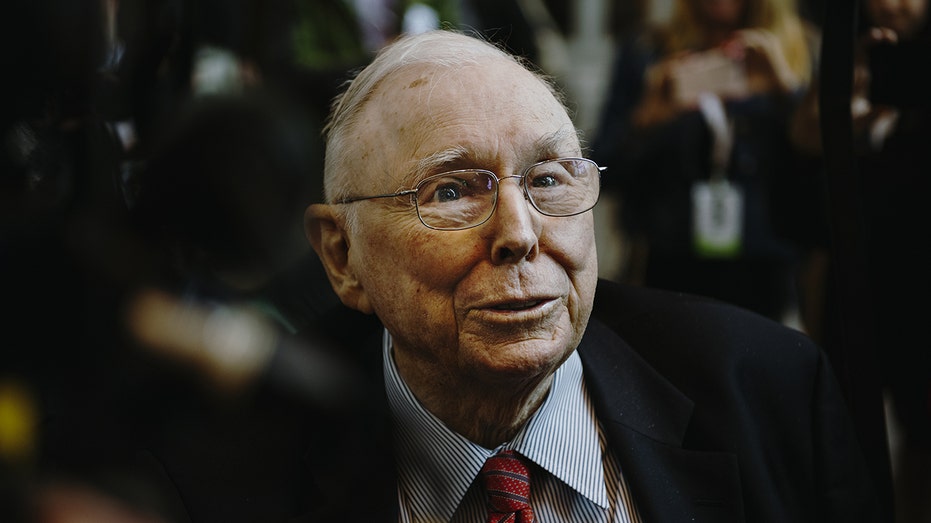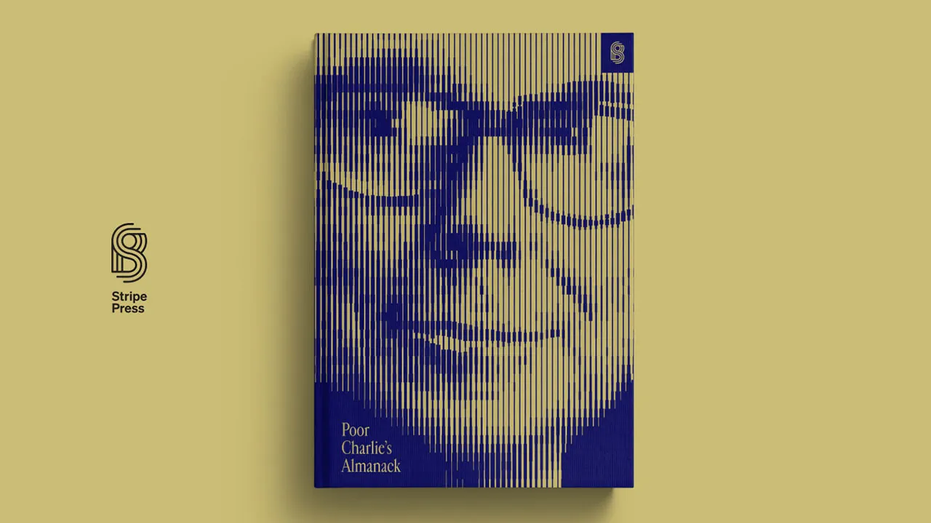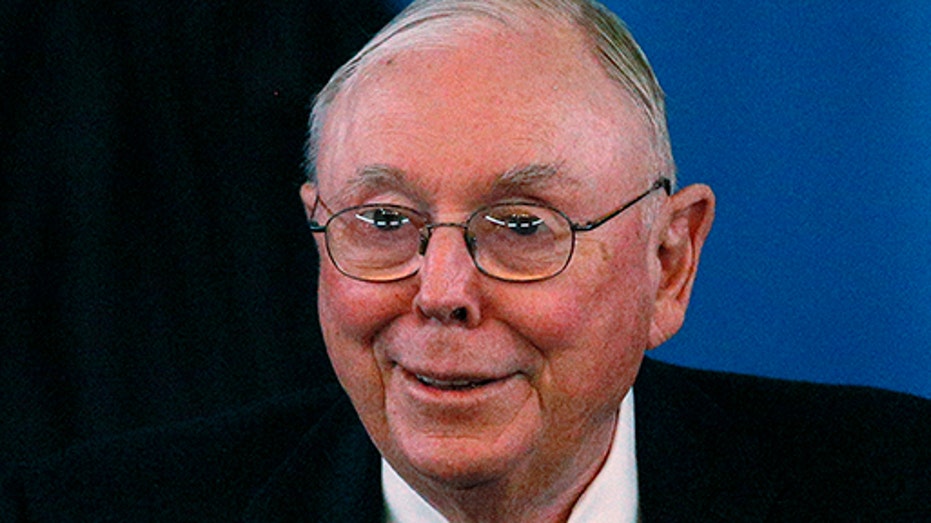Berkshire Hathaway’s Charlie Munger on core ideas that helped him succeed in life and business
Munger left behind his wit, wisdom — and a new book full of inspiration
Charlie Munger lovingly remembered for his 'joy and wisdom'
'The Warren Buffett Shareholder' author Lawrence Cunningham reflects on life and legacy of the Berkshire Hathaway vice chairman on 'The Claman Countdown.'
Berkshire Hathaway announced earlier this week the passing of Charlie Munger, the billionaire and vice chairman of the company.
Munger would have turned 100 on New Year's Day, Jan. 1, 2024. He was the longtime business partner of Warren Buffett as well as a close friend who helped build the conglomerate they both steered for decades.
"Berkshire Hathaway … was advised by members of Charlie Munger’s family that he peacefully died this morning at a California hospital," the company said on Tuesday in a press release.
BERKSHIRE HATHAWAY'S FUTURE AFTER CHARLIE MUNGER'S PASSING
Buffett himself said in a statement, "Berkshire Hathaway could not have been built to its present status without Charlie’s inspiration, wisdom and participation."
| Ticker | Security | Last | Change | Change % |
|---|---|---|---|---|
| BRK.A | BERKSHIRE HATHAWAY INC. | 747,806.00 | -14,763.63 | -1.94% |
| BRK.B | BERKSHIRE HATHAWAY INC. | 498.08 | -10.01 | -1.97% |
Shares of Berkshire's B class stock, created in May of 1996 to lure a new crop of investors, has returned over 1,446%, as tracked by Dow Jones Market Data Group.
Berkshire Hathaway
Among the many talks Munger gave throughout his lifetime — sharing that inspiration and wisdom with others — was a commencement address to the University of Southern California Gould School of Law, on May 13, 2007.
In that 2007 speech, Munger "offered insights into the practices that contributed to his success and to his standing as one of the wealthiest people in the world."

Charlie Munger, vice chairman of Berkshire Hathaway Inc., is shown speaking to the media during a shareholders shopping day ahead of the Berkshire Hathaway annual meeting in Omaha, Nebraska, on May 3, 2019. (Houston Cofield/Bloomberg / Getty Images)
Among his observations in that talk: "The acquisition of wisdom is a moral duty," he said.
He also told those assembled that he realized during his time in law school that "the best road to success in life and learning would be a multidisciplinary one."
That speech — and many others he delivered — are included in a new book, which also includes commentary and recollections about Munger by others. (Buffett wrote a foreword.)
CHARLIE MUNGER, FRIEND AND BUSINESS PARTNER OF WARREN BUFFETT, DEAD AT 99
Here, from FOX Business, is an exclusive excerpt from the new book, "Poor Charlie's Almanack: The Essential Wit & Wisdom of Charles T. Munger" (Stripe Press, Dec. 5, 2023).
‘Ideas and attitudes that have worked well for me,’ by Charlie Munger, from 'Poor Charlie's Almanack'
Munger: What are the core ideas that helped me?
Luckily, I had the idea at a very early age that the safest way to try to get what you want is to try to deserve what you want.
It’s such a simple idea. It’s the golden rule.
You want to deliver to the world what you would buy if you were on the other end. There is no ethos in my opinion that is better for any lawyer or any other person to have.

Stripe Press has just published "Poor Charlie's Almanack: The Essential Wit & Wisdom of Charles T. Munger." The book jacket is pictured here. (Stripe Press / Fox News)
By and large, the people who have had this ethos win in life, and they don’t win just money and honors.
They win the respect, the deserved trust of the people they deal with. And there is huge pleasure in life to be obtained from getting deserved trust.
Occasionally, you will find a perfect rogue of a person who dies rich and widely known. But mostly these people are fully understood as despicable by the surrounding civilization.
"There is huge pleasure in life to be obtained from getting deserved trust."
If the cathedral is full of people at the funeral ceremony, most of them are there to celebrate the fact that the person is dead.
The second idea that I developed very early is that there’s no love that’s so right as admiration-based love, and such love should include the instructive dead.
Somehow, I picked up that idea, and I’ve lived with it all my life. It’s been very useful to me.
A love like that described by [William] Somerset Maugham in his book "Of Human Bondage" is a sick kind of love. It’s a disease, and if you find yourself with a disease like that, you should eliminate it.

"Without lifetime learning, you people are not going to do very well," Munger told a graduating class of law students. "You are not going to get very far in life based on what you already know." (Patrick T. Fallon/Bloomberg via Getty Images / Getty Images)
Another idea, and this may remind you of Confucius, too, is that the acquisition of wisdom is a moral duty. It’s not something you do just to advance in life.
And there’s a corollary to that idea that is very important. It requires that you’re hooked on lifetime learning. Without lifetime learning, you people are not going to do very well. You are not going to get very far in life based on what you already know.
You’re going to advance in life by what you learn after you leave here.
Consider Berkshire Hathaway, one of the best-regarded corporations in the world. It may have the best long-term, big-assets-involving investment record in the history of civilization.
The skill that got Berkshire through one decade would not have sufficed to get it through the next decade with comparable levels of achievement. Warren Buffett had to be a continuous learning machine.
WARREN BUFFETT DONATES THANKSGIVING MILLIONS, PRAISES USA
The same requirement exists in lower walks of life. I constantly see people rise in life who are not the smartest, sometimes not even the most diligent. But they are learning machines.
They go to bed every night a little wiser than they were that morning. And boy, does that habit help, particularly when you have a long run ahead of you.
Alfred North Whitehead correctly said at one time that the rapid advance of civilization came only when man "invented the method of invention." He was referring to the huge growth in GDP per capita and many other good things we now take for granted.
Big-time progress started a few hundred years ago. Before that, progress per century was almost nil. Just as civilization can progress only when it invents the method of invention, you can progress only when you learn the method of learning.

Charlie Munger (right) with Warren Buffett. "If you watched him with a time clock," said Munger about Buffett, "you’d find that about half of his waking time is spent reading." (JOHANNES EISELE/AFP via Getty Images / Getty Images)
I was very lucky. I came to law school having learned the method of learning, and nothing has served me better in my long life than continuous learning.
Consider Warren Buffett again. If you watched him with a time clock, you’d find that about half of his waking time is spent reading.
Then a big chunk of the rest of his time is spent talking one-on-one, either on the telephone or personally, with highly gifted people whom he trusts and who trust him.
Viewed up close, Warren looks quite academic as he achieves worldly success.
Another idea that was hugely useful to me was one I obtained when I listened in law school when some waggish professor said, "A legal mind is a mind that considers it feasible and useful, when two things are all twisted up together and interacting, to try to think about one thing without considering the other."
"Once you have the ideas, of course, you must continuously practice their use."
Well, I could see from that indirectly pejorative sentence that any such legal approach was ridiculous.
And this pushed me further along in my natural drift, which was toward learning all the big ideas in all the big disciplines, so I wouldn’t be the perfect damn fool the professor described.

Warren Buffett, chairman and chief executive officer of Berkshire Hathaway Inc., speaks during a Bloomberg Television interview in New York on Wednesday, Aug. 30, 2017. (Christopher Goodney/Bloomberg via Getty Images / Getty Images)
And because the really big ideas carry about 95% of the freight, it wasn’t at all hard for me to pick up about 95 percent of what I needed from all the disciplines and to include use of this knowledge as a standard part of my mental routines.
Once you have the ideas, of course, you must continuously practice their use. Like a concert pianist, if you don’t practice you can’t perform well.
So I went through life constantly practicing a multidisciplinary approach.
Well, this habit has done a lot for me. It’s made life more fun. It’s made me more constructive. It’s made me more helpful to others. It’s made me richer than can be explained by any genetic gifts.
WARREN BUFFETT CHARITABLE DONATIONS TOP $51B AFTER LATEST GIFT
My mental routine, properly practiced, really helps.
Now, there are dangers in it because it works so well. If you use it, you will frequently find when you’re with some expert from another discipline — maybe even an expert who is your employer, with a vast ability to harm you — that you know more than he does about fitting his specialty to the problem at hand.
You’ll sometimes see the correct answer when he’s missed it. That is a very dangerous position to be in.

Berkshire Hathaway Vice Chairman Charlie Munger arrives to begin the company's annual meeting in Omaha on May 4, 2013. (REUTERS/Rick Wilking / Reuters)
You can cause enormous offense by being right in a way that causes somebody else to lose face in his own discipline or hierarchy.
I never found the perfect way to avoid harm from this serious problem. Even though I was a good poker player when I was young, I wasn’t good enough at pretending when I thought I knew more than my supervisors did.
"You can cause enormous offense by being right in a way that causes somebody else to lose face in his own discipline."
And I didn’t try as hard at pretending as would have been prudent. So I gave a lot of offense.
Now, I’m generally tolerated as a harmless eccentric who will soon be gone. But coming up, I had a difficult period to go through.
My advice to you is to be better than I was at keeping insights hidden.
One of my colleagues, who graduated as number one in his class in law school and clerked at the U.S. Supreme Court, tended as a young lawyer to show that he knew a lot.
GET FOX BUSINESS ON THE GO BY CLICKING HERE
One day, the senior partner he was working under called him in and said, "Listen, Chuck, I want to explain something to you. Your duty is to behave in such a way that the client thinks he’s the smartest person in the room. If you have any energy or insight available after that, use it to make your senior partner look like the second-smartest person in the room."
And "only after you’ve satisfied those two obligations do you want your light to shine at all."
Well, that was a good system for rising in many a large law firm.
CLICK HERE TO SIGN UP FOR OUR LIFESTYLE NEWSLETTER
But it wasn’t what I did.
I usually moved with the drift of my nature, and if some other people didn’t like it, well, I didn’t need to be adored by everybody.
Excerpted from "Poor Charlie’s Almanack" by Charles T. Munger, Copyright 2023 by Stripe Press. All rights reserved.
For more Lifestyle articles, visit www.foxbusiness.com/lifestyle.




















